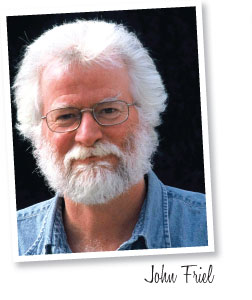5/1/2019
New Ground
John Friel

My mother's meatloaf was never the same twice. Composed of the week’s leftover proteins, reshaped and repurposed, it was a little of this, a little of that.
This month’s column is like that: a new take on outtakes from previous offerings, excised due to space constraints.
Historian/philosopher Will Durant said, “One of the lessons of history is that nothing is often a good thing to do.” That's a lesson of nature, too, according to Barbara McMackin of Brooklyn Bridge Botanic Garden. At a conference last October, she referenced a gardening technique that gardeners will either love or loathe: the “leave the leaves” movement.
Trees and shrubs don’t shed leaves in fall like out-of-style summer clothes. They lay them down as part of a complex process: Decomposing foliage, a.k.a. duff, amends the soil, adjusting nutrients and acidity to its donors’ liking. It also harbors overwintering insects, including native pollinators. When we rake, shred and tidy up, we thwart those strategies. Solution? Do less. Leave the leaves. “Accept chaos,” Barbara advised.
Sounds like a win-win, right? Less work, happier flora and fauna. But will we do it … or rather, not do it? Mostly, no. We’re too fond of, and invested in, buttoning down our borders at season’s end. Some of us make a good living pouncing on every fallen leaf and extraditing it to the local composting yard. The nation’s HOAs would also need convincing and possibly defibrillating.
At the same conference, speaker Kelly Dodson bestowed well-earned kudos on a favorite public garden near Philadelphia: “Chanticleer is a horticultural Hogwarts, staffed by wizards and sorcerers.” Hear, hear. If you’ve not yet visited, put Chanticleer on your Must-See List. It’s one of the brightest of the Delaware Valley’s many garden gems.
Same conference, different year: Garden designer and author Noel Kingsbury exhorted, “Dream in landscape and plant in portrait.” He didn’t explain, but I think he meant that planning a garden expands one’s vision to encompass a big-picture whole, but planting it narrows one’s focus to individual holes, spade by spade. Odd how a single letter changes not just a word, but the meaning of whole phrases: planning vs. planting, whole vs. hole.
At yet another conference, Neil Diboll of Prairie Nursery in Wisconsin lamented, “The typical American garden is like a hospital; all the plants are on life support.”
Neil was growing and selling natives long before they were cool and he helped mainstream them. I’m not so sure there IS a “typical American garden,” but if there were, it wouldn’t conform to Neil’s ideal.
“If I don’t see holes in leaves, I’m a failure,” he told his audience. “When I see holes, I know I’m feeding insects. I’m feeding caterpillars.” Which blows the cover on the dirty little secret of pollinator gardens. Attracting nectaring butterflies is just one phase. You also have to accept some chaos.
Will Durant also said that “Nothing ... is always a clever thing to say.” That's not just for people; it’s a rule I impose on AI-infested electronics.
Getting a new smartphone, as I recently reluctantly did, means disabling some of its allegedly helpful bells and whistles, especially spell-check. I think everybody should gag that mischievous software, but that would deprive whole websites of hilariously erroneous texts spawned by capricious algorithms and careless thumbs.
Frustrated by your device’s Quixotic interpretations of your spelling or (shudder) grammar? Go cold turkey. I quickly found I don’t need spell-check to screw up my prose. Eye ken dew wit awl buy mice elf.
That last “sentence” is pure gibberish, pure phonetics. But it glides through spell-check like leftovers through a grinder. GP
John Friel is marketing manager for Emerald Coast Growers and a freelance writer.